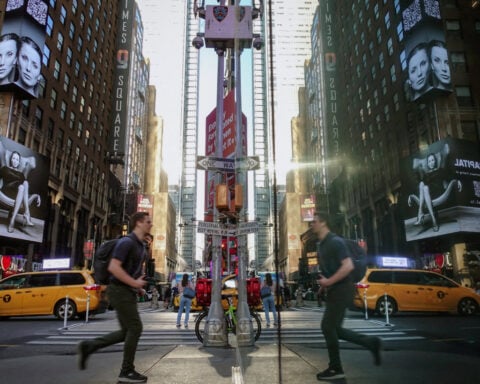For bargain hunters, there's no greater thrill than scoring a designer handbag or trendy outfit at TJ Maxx's famously discounted prices. But while shoppers revel in their runway steals, a harsh reality lurks behind those steeply marked-down deals - many employees stocking the racks and ringing up sales don't earn enough to make basic ends meet themselves.
One TikTok user expressed disappointment and regret for considering a job opportunity at T.J. Maxx after discovering that the offered hourly wage for the position was only $12. In a video shared by user @sobeatmyass, they revealed that the meager pay rate was not disclosed until the closing stages of the job interview process.
Despite TJ Maxx's runaway success as a discount retail juggernaut, the wages paid to cashiers, salespeople and stockroom staff at some store locations are so paltry, they render economic stability an uphill battle. In certain cases, TJ Maxx employees take home as little as $5 an hour according to recent reports - well below the already inadequate $7.25 federal minimum wage that has stayed frozen since 2009, even as rental costs, grocery bills and other expenses have soared.
"These poverty wages TJ Maxx is paying many of its workers are a moral and economic injustice," said labor activist Frances Wilkins. "For a massively profitable corporation to pay full-time staff salaries so low they're impoverished is simply inexcusable."
Wilkins' criticism is backed by data from the watchdog group Fair Wage Advocates. Their study shockingly revealed tens of thousands of TJ Maxx employees across the country subsisting on incomes below the federal minimum wage line. For many like Alicia Gaines, that scant paycheck never comes close to covering the basics.
"I'm one of those TJ Maxx employees, a single mom barely making $8 an hour after five years with the company," said Gaines, a sales associate in Ohio. "My 30-hour weekly paycheck always has me scrambling and delaying bills, skipping meals just so I can feed my kids or keep the lights on. These low wages at TJ Maxx make you feel trapped in a constant cycle of sacrifices just to survive."
Gaines' struggle to make ends meet despite being a loyal, hardworking employee is a stark contrast to the billions in profits enjoyed by TJX Corporation, TJ Maxx's parent company. Last year, the retail behemoth hauled in over $49 billion in revenue - windfalls that extended to top executives and investors, even as many of the front-line workers relied on for that windfall found themselves mired in working poverty and financial instability.
According to cost-of-living calculations by experts at MIT, a single adult needs over $15 an hour just to tread water on basic expenses like rent, groceries and healthcare in most U.S. regions today. For a single parent like Gaines, that number skyrockets to nearly $30 hourly. But those minimal self-sufficiency wages remain hopelessly out of reach for droves of the TJ Maxx workforce stuck in the lower income trenches.
"When a hugely successful company squeezes its frontline staff to that unconscionable degree, it's sacrificing human dignity for corporate greed," Wilkins said bluntly. "These businesses are literally building their profits on the backs of workers trapped in perpetual working poverty."
In response to the growing outcry, TJX Corp. has staunchly defended its employment practices as "fair and competitive within the retail industry." Company reps insist that performance incentives allow many TJ Maxx employees to boost their effective pay beyond minimum wage levels.
But critics like Wilkins argue those periodic bonuses and commissions are mere band-aids failing to address the crux of the issue - the fact that TJ Maxx's rock-bottom base wages and limited part-time schedules force legions of employees into unstable financial scenarios dependent on public assistance, food banks and spiraling debt simply to keep afloat paycheck to paycheck.
"You can't just pay lip service to this systemic lack of livable compensation by regurgitating tired claims about being 'competitive' with other retailers," Wilkins said. "TJ Maxx has to decide whether profiting from a business model that degrades working families' economic security is really acceptable in 2024."
There's also a proven business upside to paying employees a livable wage. A raft of studies from institutions like Harvard and MIT have linked higher pay to measurable benefits like reduced turnover costs, increased productivity and worker loyalty, and improved customer satisfaction metrics. Many experts argue investing in a well-compensated, financially secure frontline workforce is simply smart long-term management.
As the national debate intensifies over issues like income inequality, stagnant wages and the proliferation of the working poor in America, the plight of the underpaid retail workforce at chains like TJ Maxx is taking on fresh urgency. With the current extraordinarily tight labor market, workers previously resigned to poverty-level wages may finally have the leverage to demand substantive raises from employers reluctant to boost compensation.
"This represents a pivotal moment for TJ Maxx and its corporate peers to get ahead of this issue through voluntary, proactive reforms to wages and worker pay - or they risk escalating public backlash, worsening staffing shortages, and potentially government intervention over substandard compensation standards," Wilkins warned. "Relying on poverty-level salaries that commoditize the workforce is simply not an ethical or sustainable business model long-term. TJ Maxx and other highly profitable companies must decide whether they want to be part of the solution by uplifting working families - or stay firmly entrenched as part of America's working poverty problem."

 An analyst looks ahead to how the US economy might fare under Trump
An analyst looks ahead to how the US economy might fare under Trump
 Hyatt in exclusive talks with Playa Hotels on options, including buyout
Hyatt in exclusive talks with Playa Hotels on options, including buyout
 Elon Musk's X lifts price for premium-plus tier to pay creators
Elon Musk's X lifts price for premium-plus tier to pay creators
 Pandas An An and Ke Ke celebrate their 1st Christmas in Hong Kong
Pandas An An and Ke Ke celebrate their 1st Christmas in Hong Kong
 Greenland is not for sale, its leader says in response to Trump
Greenland is not for sale, its leader says in response to Trump
 Rome completes marquee project in contentious city overhaul for Catholic Holy Year
Rome completes marquee project in contentious city overhaul for Catholic Holy Year
 @sobeatmyass/TikTok
@sobeatmyass/TikTok






